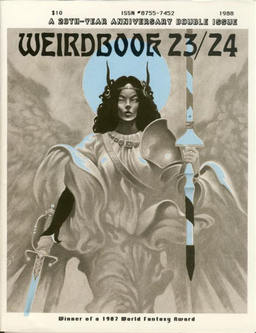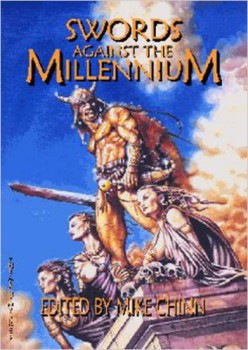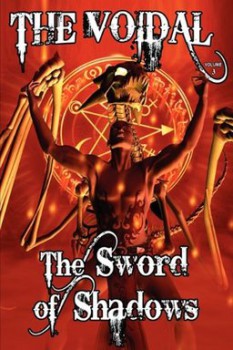It Is A Busy Omniverse: The Sword of Shadows: The Voidal Vol. 3 by Adrian Cole
Tyrandire, the Palace of Pain, moves secretly and silently through unseen tunnels between the many dimensions of the omniverse, traversing any of them that its grim master wishes to visit. A minute moon, perfectly circular, colder than terror, Tyrandire speeds on its way like light, sometimes lingering like a biting frost. The energy that charges this oval missile is greater than that of any sun, indeed greater than the energy contained within an entire universe, for it is the will of the outlaw god, Ubeggi the Deceitful. Where Ubeggi seeks to go, his Palace of Pain takes him. He has many missions, all of them selfish, all of them corrupt, for the Weaver of Wars exists solely for his own amusement and he delights in knotting together the workings of more thoughful gods or undoing their orderly tapestries of fate. All the gods know of Ubeggi, and when his Palace of Pain nears their own haunts in the omniverse, they curse him, knowing that his mischief will be upon them.
from Part One: The Weaver of Wars
And so, with The Sword of Shadows, we come to the end of the Voidal’s saga. For a series I have already called favorably “a study in sensory overload,” and “excessive, over the top, and incredibly phatasmagorical,” author Adrian Cole ends things as madly and wildly as a reader could hope.
Three of its eight chapters, were published previously as short stories: “The Weaver of Wars,” “At the Council of Gossipers,” and “Dark Destroyer.” Unlike the two previous books, this one reads more like a coherent novel than as a fix-up.
At the start of the first volume, The Oblivion Hand, the Voidal was bereft of his memories, lacking the ability to prevent himself from being tossed around the omniverse by the Dark Gods, and burdened with the powerful and destructive Oblivion Hand in place of his own right one. By the end of the next volume, The Long Reach of Night, the Voidal had recovered some of his memories, was beginning to be able to chart some of his own destiny, his real hand was returned, and he had acquired a sidekick, the batrachian familiar, Elfloq.
Now the Voidal is ready to test the limits of his reacquired freedom, and discover who he really is and why he has been in bondage. His quest is an epic one that entails the destruction of the war god Ubeggi, plunges on through the astral plane, leaves a world broken forever, and ends at the center of all Creation.
That’s all I want to reveal about this book. As the last of a trilogy, The Sword of Shadows doesn’t stand very well on its own. However, as each volume has around only two hundred pages, there’s no excuse not to read them. What I do want to write about is how much I’ve come to like these books and how they’ve reawakened in me a love for the most sensational roots of swords & sorcery. One of the best ways to show that is to give several of my favorite passages from the book.
 On Cole’s site he quotes from Lin Carter describing an early story about Elfloq: “…as inventive as Jack Vance, with much of Michael Moorcock’s brooding gloom…” There’s definitely truth in that description, though I think these stories have more of the baroque, psychedelic outlandishness of Clark Ashton Smith to them than Vance’s somewhat more mannered style.
On Cole’s site he quotes from Lin Carter describing an early story about Elfloq: “…as inventive as Jack Vance, with much of Michael Moorcock’s brooding gloom…” There’s definitely truth in that description, though I think these stories have more of the baroque, psychedelic outlandishness of Clark Ashton Smith to them than Vance’s somewhat more mannered style.
While he cites the writers Edgar Rice Burroughs and H. P. Lovecraft among his literary influences, the author whose work I’m most reminded of here is Lin Carter. Like Carter, Cole has a deep understanding of and love for the limitlessness offered by fantasy fiction. If you want a living ship that travels the aetherial seas, animated vines a mile in circumference, or mysteries that could shatter one’s sanity, why not just write it?
He also has Carter’s love for the genre without the need to make of it anything more than great fun. He doesn’t need to deconstruct it like Moorcock, instead he builds it higher and more elaborately. What he does have that Carter sadly lacked most of the time, is the ability to convey these things in readable, and often quite riveting, prose.
Much of The Sword of Shadows takes place on a world covered by the bodily wreckage of an ancient war among the gods and their armies:
The inifinite expanse of tangled metal was silent as the horses came down the last narrow canyon to its edge. Dawn began to unravel individual curves of metal from the mass, emphasising the features of those immense suits of armour, weapons and war machines that bloody chaos and then time had blended into this nightmare fusion. Huge steel gauntlets jabbed fingers up at the sun, hung from slintered bone accusingly, like mad towers. Early rays splashed like blood on the buckled sheets of steel, or daubed curved bones, some encased, others pile high in parody of statues. It was a landscape of fallen giants, incredible warriors who had clashed in their thousands and dashed themselves to oblivion against each other, waves breaking on a pitiless shore.
from Part Six: Among the Bones of Giants
 In order to journey to where he hopes to confront his oppressors, the Dark Gods, the Voidal summons up a great living ship called Evergreed.
In order to journey to where he hopes to confront his oppressors, the Dark Gods, the Voidal summons up a great living ship called Evergreed.
“In the ominverse,” Evergreed continued, “there were many choices of things to devour and for a long time I fed on all manner of them, ever more voraciously: men, beasts, demons, sweet and bitter alike. Then one day — by pure accident, you understand — I devoured a minor deity. Such a trivial, hardly worshipped deity! And yet, for all his worthlessness, such a delicious victual! From that moment I had become addicted, enslaved. In no time at all I had eaten other small gods, until at last the time came when I swallowed quite a large god. Ah, succulent Octopang! My sins then came to the attention of far greater gods than I.
from Part Seven: Gate at the Edge of Reason
Cole doesn’t always write all maxed out. As in this discription of the world where the Council of Gossipers is meeting, he can write more subtly:
Lost somewhere in the impenetrable vastness of the astral realms lies an old world of dust and shadows that no longer has a name, a world that was once firmly rooted in one of the many dimensions, but which now has faded not only from human memory but also from corporeal existence. In the astral realm it is real enough, though even here it fades like a neglected memory, or a simple act of no significance beyond recall.
from Part Two: At the Council of Gossipers
The Voidal books are intoxicating. Cole’s imagination is apparently boundless and he makes no effort to rein it in. The crazed carnage and inventiveness puts to shame so much of what passes for fantasy these days. Too many authors seem to want to downplay fantastic elements instead of seeing how far they can run with them.
There was a time when I rejected fantasy as exuberant as Cole’s Voidal stories. I read books that were supposedly more realistic, more thoughtful, and more mature. I’ve come to the conclusion that that’s a load of hogwash. Not that there’s anything wrong with books that meet those criteria, but I’m reading fantasy for fun, not to prove some sort of point. As long as the storytelling’s good and the quality of the writing doesn’t make me shudder, then most of the time what I want from swords & sorcery is a day pass from reality; a sojourn that maybe speaks to the heroic and adventurous urges that lurk inside me.
Adrian Cole and the Voidal led me back to the pulpiest of pulp roots of swords & sorcery and they can do it for you too. If you long for stories awash in planet-cracking magics, endless swarms of demon warriors, and a magic sword to end all magic swords, then snag a copy of The Oblivion Hand (available in trade and e-book from the magnificent folks at Wildside Press) and get yourself started. If you felt even a little twitch reading the excerpts above, I can safely predict you will not be disappointed with the series.

Thanks for this series of articles. Voidal sounds a lot like my preferred mode of fantasy.
Definitely good reads and reminders of how wild fantasy can be
Great review, Fletcher. I’ve been a fan of Cole and the Voidal since ’79. I consider Cole superior to Moorcock in most ways. It’s good to see him gaining some more recognition in his twilight years.
I wish I had discovered these stories years ago. Maybe it won’t be his twilight years – now that he’s retired from his day job it looks like he might be writing more.
Honestly, I’m not sure if you could’ve discovered these stories years ago. I read one of the Voidal stories in Heroic Fantasy (the Gerald Page anthology) ten or fifteen years ago, was really intrigued, and couldn’t find any additional Voidal books for blood nor money. Heck, I couldn’t even confirm that such a thing existed until the Wildside reprints.
I may be repeating myself from comments on previous volumes, but I’m glad they’re available again (or at last) — they’re certainly rough around the edges, but I love this sort of multiplanar fantasy and think we don’t get nearly enough of it these days.
@JoeH:
Honestly, I just rechecked. I should have written “Elfloq”, not “Voidal”.
I picked up the second volume in AC’s “Dream Lords” trilogy in ’79 and read “Astral Stray” soon after in HEROIC FANTASY (one of the great S&S collections). I finally read some actual Voidal tales when I picked up a few Weirdbooks at a con several years later. I also read the Omaran Saga in the late ’80s, which I still enjoy.
Deuce — Well, I think “Elfloq” and “Voidal” are pretty much interchangeable as far as discussing the series goes.
And now that I’m looking at the copyright pages in the Wildside editions, I’m not sure if there even were any prior collections — it looks like he had written a bunch of stories, some of which were sold, and some of which were published, but primarily in relatively small/obscure magazines or anthologies.
No, prior to the Wildside books, there weren’t any collections. In fact, Cole’s intro to the The Long Reach of Night mentions which stories were scheduled for publication previously but the magazines he’d sold them to folded. Wildside did us all a great favor putting out these collections.